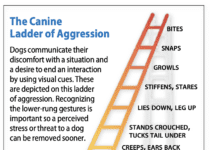Q I read with interest your November editorial, which talked a little about pit bulls. Your comment about pit bulls having locking jaws is way off base and untrue. Please consider a follow-up. There is no dog that has magical locking jaws! As a pit bull owner who fights stereotypes every day, I hope you can understand that a comment like that sets us back 10 years. Thank you, and I am looking forward to your response.
Avis A. Ayers
Alton, Illinois
Dear Ms. Ayers,
A You raise an important point. Despite urban (and suburban) myth, pit bulls do not have locking jaws that can’t be pried open once they clamp down because of some kind of unusual mechanical apparatus. And if you look back at the editorial, you’ll see that we did not say that they do. However, they do have the genetic potential to bite down hard and not want to let go. That’s what we mentioned in our editorial, to wit, “the genes of one with a powerful jaw that clamps down and doesn’t let go.”
Why is that? It’s because pit bulls are descended from dogs in England who were bred as many as 1,000 years ago to bait and hold bulls, bears, and other large animals around the face and head. Add to that the fact that in the 1800s, pit bulls were bred to fight other dogs for entertainment, and you can understand why today’s pit bulls are genetically encoded with the potential to fight. And not only to fight but to stay in the game, to have the will to finish what they start. In fact, they were bred to withstand crushing injuries even as they continued at their task.
In other words, the aim in breeding pit bulls of yore was to create the most determined kind of dog who would never give up. That’s where the myth about jaw locking comes in. A pit bull is physically capable of releasing his grip with his jaw; he just has a genetic predisposition to hang on that was once prized.
Does it mean that all pit bulls exhibit this behavior, or at such an intensity? Absolutely not. Many pit bulls are canine pussycats who through their entire lives will never show an ounce of aggression, and pit bulls of any stripe certainly do not bite people more than dogs of other breeds, as that is not what they were bred for. But the predilection to get into fights with other dogs is still there — 1,000 years is not a long time, genetically speaking.
Granted, even then, it doesn’t happen often (although it happens more often than with dogs of other breeds; that’s not in dispute). It’s that when it does happen and the pit bull goes off, the consequences can be serious, even lethal. Their genetic scaffolding simply sets them up for that.
Should pit bulls be banned or legislated against for this reason? Absolutely not. Rather, the take-away is that anyone adopting a pit bull should be aware from the start that as docile as a pit bull might seem at the shelter, he can have certain tendencies that require realistic expectations and firm (not mean) leadership. It means training a pit bull with kindness, never using choke or chain collars on him, and socializing the dog with other dogs, and with people. It means using precautions in public — a collar and a lead, and, if necessary, a basket muzzle.
That is, if you are a strong, loving leader who remains aware of your pit bull’s genetic potential, you have a reasonable chance of ending up with a good, and safe, pet.




